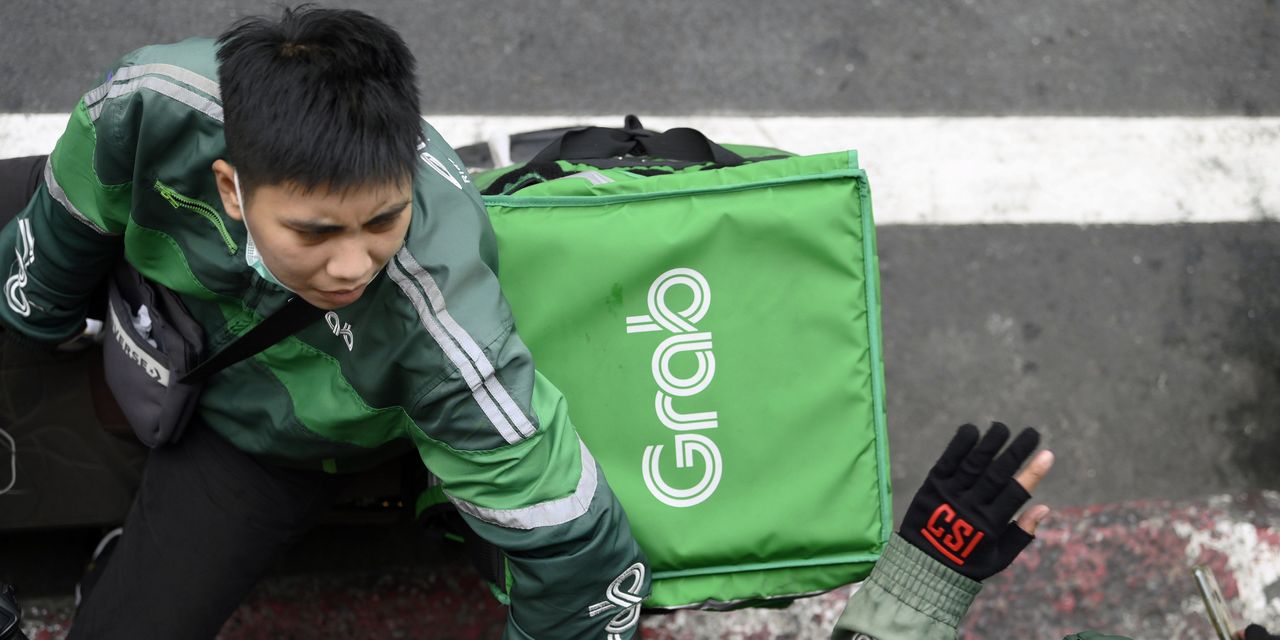
Grab Holdings Ltd. , the Southeast Asian superapp that set a high watermark for SPAC mergers last year, has quickly become one of the market’s biggest post-listing flops.
On Thursday, Grab’s shares plunged 37% to $3.28 apiece after the company released its 2021 results, taking its market capitalization down to around $12 billion. The Singapore-headquartered company reported a 44% drop in fourth-quarter revenue to $122 million, and said it booked barely any revenue from food deliveries because of higher incentives it paid out to boost business volumes. More spending is in the cards, its executives said.
Like Western platforms such as Uber Technologies Inc. before it, Grab has been fighting expensive battles for market share with other well-funded rivals and startups, effectively boosting driver pay and cutting costs for customers to increase market share.
That growth strategy—often seen in companies that, like Grab and Uber, are backed by SoftBank Group Corp. —has fallen from favor as global investors have soured on stocks of companies that will take years to become profitable. India’s One97 Communications Ltd. , another SoftBank-backed company and the owner of mobile payments network Paytm, has slid more than 60% below its initial public offering price since listing in November 2021.
Grab is also the latest in a string of so-called “de-SPAC” deals that have performed poorly in the stock market following last year’s issuance boom. Special-purpose acquisition companies raise money and list before finding businesses to merge with, and have presented an alternative and faster route for many less established startups to go public. But some companies that merged with SPACs have since undershot the business projections that earlier helped draw in investors.
An exchange-traded fund called the De-SPAC ETF, which holds stocks of 25 companies—including Grab, WeWork Inc. and SoFi Technologies Inc. —that have gone public via SPACs, has fallen more than 30% so far this year.
“There’s still a stigma for companies that come public through SPACs,” said Matthew Tuttle, chief executive and investment chief of Tuttle Capital Management LLC, which is the adviser to the De-SPAC ETF. “There’s some crappy deals out there, and it’s guilt by association.”
Grab on Thursday posted a $1.1 billion quarterly loss, taking its 2021 losses to $3.6 billion. The company, which operates in eight countries, posted annual revenue of $675 million, up 44% from the year before, and gross merchandise value that topped $16 billion.
The company’s forecasts for gross-merchandise-value increases in the next few quarters, however, appeared to fall short of a 2022 growth projection that Grab had made last spring, according to Sachin Mittal, head of internet and telecom research at DBS Bank Ltd.
Grab’s consumer incentives, or the amount of discounts and promotions offered to customers, more than doubled to $365 million for the fourth quarter. The company said partner incentives, or those granted to drivers and merchants Grab works with, rose 74% to $218 million.
“The Grab results were certainly disappointing,” said Nirgunan Tiruchelvam, head of consumer equity research at Tellimer, adding that the company spent more than expected on incentives.
Grab plans to continue investing in driver incentives to recover driver supply as demand for ride-hailing services recover after pandemic-related lockdowns in the third quarter. “It’s going to take about one or two quarters for us to get to the right equilibrium for demand and supply to match together,” finance chief Peter Oey told analysts Thursday.
“We’re focusing on executing the business, and we feel that the stock price will take care of itself,” Mr. Oey said in a separate interview with The Wall Street Journal.
Citigroup Inc., in a note to clients after the results, said it views Grab’s selloff as a buying opportunity. “We believe broad market weakness amid geopolitical instability might have prompted some investors to cut losses on their position,” Citi analysts said. The Russia-Ukraine war has led to volatility in markets.
Souring on SPACs
Grab also is facing stiff competition from providers of similar services in Southeast Asia like Singapore-based digital games and e-commerce giant Sea Ltd. , and Indonesia-based GoTo, which is private and has plans to go public.
Sea, which is also listed in New York, produces far more revenue than Grab, but it is also loss-making and its market capitalization has fallen 55% over the last three months to about $61 billion, according to FactSet. The company earlier this week said its fourth-quarter revenue more than doubled to $3.2 billion, but its net loss widened to $618 million as it also spent heavily on growing market share.
“Someone has to stop burning cash,” said Mr. Mittal, the DBS analyst, adding that investors ultimately want to see companies having a clear path to profitability.
Write to Dave Sebastian at [email protected]
Copyright ©2022 Dow Jones & Company, Inc. All Rights Reserved. 87990cbe856818d5eddac44c7b1cdeb8







